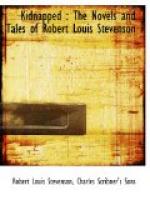We made good company for each other. Alan, indeed, expressed himself most lovingly; and taking a knife from the table, cut me off one of the silver buttons from his coat.
“I had them,” says he, “from my father, Duncan Stewart; and now give ye one of them to be a keepsake for last night’s work. And wherever ye go and show that button, the friends of Alan Breck will come around you.”
He said this as if he had been Charlemagne, and commanded armies; and indeed, much as I admired his courage, I was always in danger of smiling at his vanity: in danger, I say, for had I not kept my countenance, I would be afraid to think what a quarrel might have followed.
As soon as we were through with our meal he rummaged in the captain’s locker till he found a clothes-brush; and then taking off his coat, began to visit his suit and brush away the stains, with such care and labour as I supposed to have been only usual with women. To be sure, he had no other; and, besides (as he said), it belonged to a king and so behoved to be royally looked after.
For all that, when I saw what care he took to pluck out the threads where the button had been cut away, I put a higher value on his gift.
He was still so engaged when we were hailed by Mr. Riach from the deck, asking for a parley; and I, climbing through the skylight and sitting on the edge of it, pistol in hand and with a bold front, though inwardly in fear of broken glass, hailed him back again and bade him speak out. He came to the edge of the round-house, and stood on a coil of rope, so that his chin was on a level with the roof; and we looked at each other awhile in silence. Mr. Riach, as I do not think he had been very forward in the battle, so he had got off with nothing worse than a blow upon the cheek: but he looked out of heart and very weary, having been all night afoot, either standing watch or doctoring the wounded.
“This is a bad job,” said he at last, shaking his head.
“It was none of our choosing,” said I.
“The captain,” says he, “would like to speak with your friend. They might speak at the window.”
“And how do we know what treachery he means?” cried I.
“He means none, David,” returned Mr. Riach, “and if he did, I’ll tell ye the honest truth, we couldnae get the men to follow.”
“Is that so?” said I.
“I’ll tell ye more than that,” said he. “It’s not only the men; it’s me. I’m frich’ened, Davie.” And he smiled across at me. “No,” he continued, “what we want is to be shut of him.”
Thereupon I consulted with Alan, and the parley was agreed to and parole given upon either side; but this was not the whole of Mr. Riach’s business, and he now begged me for a dram with such instancy and such reminders of his former kindness, that at last I handed him a pannikin with about a gill of brandy. He drank a part, and then carried the rest down upon the deck, to share it (I suppose) with his superior.




